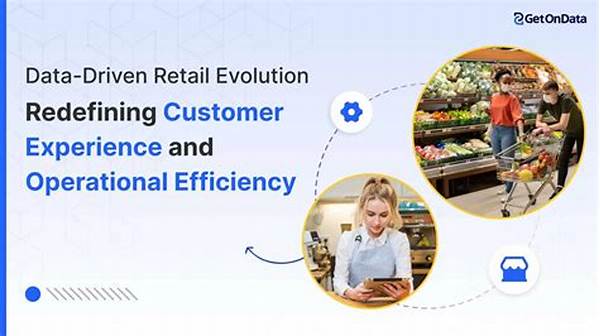In today’s fiercely competitive retail market, where every interaction can determine a customer’s loyalty, data-driven retail experience enhancement is not just a luxury—it’s a necessity. Imagine the power of understanding your customers beyond their basic demographic information and transactional history. With data-driven strategies, retailers can now analyze intricate patterns of consumer behavior, preferences, and feedback in real-time. This transformation isn’t merely about collecting data; it’s about harnessing it to create bespoke shopping experiences that are as unique as each customer, propelling your business ahead of the competition.
Read Now : Daily Wardrobe With Modest Outfits
Understanding Data-Driven Retail Experience Enhancement
The concept of data-driven retail experience enhancement focuses on utilizing data analytics to transform shopper interactions. Retailers leveraging this strategy can tailor experiences that resonate deeply with the buyer’s personal preferences and aspirations. By adopting data-driven retail experience enhancement, businesses can craft personalized marketing messages, optimize inventory based on actual demand, and create seamless in-store and online interactions. This doesn’t only lead to increased customer satisfaction and loyalty but also significantly boosts sales figures and brand reputation. With the right insights, retailers can predict future trends and transform potential challenges into opportunities for growth.
Benefits of Data-Driven Retail Experience Enhancement
1. Personalized Customer Journeys: Data-driven retail experience enhancement facilitates highly personalized shopping journeys, ensuring that every touchpoint aligns with the customer’s unique preferences.
2. Efficient Inventory Management: Leveraging customer data, businesses can optimize their inventory, reducing waste and improving stock turn-over rates by aligning supply with actual demand.
3. Enhanced Customer Engagement: Through data-driven insights, retailers can engage customers on a more profound level, using tailored communication strategies that resonate with their individual needs.
4. Trend Prediction: With data-driven retail experience enhancement, retailers can anticipate market trends, allowing them to stay ahead of competition and proactively adapt to changes.
5. Improved Decision-Making: Retailers equipped with actionable data can make informed decisions that strategically guide business growth and innovation.
Leveraging Technology for Data-Driven Retail Experience Enhancement
In the journey to achieving superior data-driven retail experience enhancement, technology plays a pivotal role. Retailers must invest in advanced analytics tools capable of processing vast amounts of data derived from multiple sources. This includes everything from purchase transactions to social media interactions, allowing for a comprehensive view of consumer behavior. Furthermore, adopting technologies like AI and machine learning can significantly enhance the personalization of retail experiences, offering insights that are not immediately visible through traditional analytics. By fully integrating these technologies into their operations, retailers can unlock unprecedented levels of customer insight and brand engagement.
Strategies for Effective Data-Driven Retail Experience Enhancement
1. Customer Segmentation: Identifying distinct customer segments is crucial for tailoring specific experiences that appeal to varying preferences and purchasing behaviors.
2. Omnichannel Integration: Ensure seamless shopping experiences across all platforms and touchpoints, powered by data insights that provide a cohesive brand interaction.
3. Real-Time Analytics: Implement real-time data analytics to respond instantly to changes in consumer behavior and market trends, optimizing the retail strategy continuously.
4. Feedback Loops: Create systems that automatically incorporate customer feedback into the data-driven retail experience enhancement process for continuous improvement.
Read Now : Budget-friendly Thrift Shopping Tips
5. Data Security and Privacy: Upholding high standards of data security is essential in building trust while implementing data-driven strategies.
6. Employee Training: Equip staff with knowledge and tools to leverage data insights effectively, enhancing customer service and operational efficiency.
7. Collaborative Platforms: Use data-sharing platforms to collaborate internally, aligning all departments towards a unified data-driven retail experience enhancement goal.
8. Predictive Modelling: Utilize predictive analytics to foresee customer trends, enabling proactive strategies that satisfy future customer needs.
9. Custom Marketing Campaigns: Using data-driven insights, tailor marketing campaigns to individual customer needs, enhancing conversion rates and customer retention.
10. Performance Metrics: Regularly measure and analyze performance metrics to assess the efficiency of data-driven retail experience enhancement efforts.
The Future of Retail Through Data-Driven Retail Experience Enhancement
The future of retail is intrinsically linked to data-driven retail experience enhancement. Businesses that embrace this paradigm shift will not only survive but thrive in the digital age. The shift from gut-feeling decision-making to data-backed strategies transforms retail operations into more sophisticated and efficient models. By continually integrating customer feedback and behavior into decision-making processes, retailers can create experiences that are inherently consumer-centric. This future promises a retail landscape where businesses are more customer-aware, adaptable, and ultimately, more successful in nurturing lasting consumer relationships.
Keys to Implementing Data-Driven Retail Experience Enhancement Successfully
Successfully implementing data-driven retail experience enhancement entails a strategic approach. First and foremost, retailers must commit to a culture of data-centricity. This involves fostering an environment where data informs every layer of decision-making, from the C-suite to frontline employees. Moreover, investment in talent skilled at interpreting complex datasets and translating insights into actionable strategies is crucial. Finally, it is imperative to maintain ethical standards in data handling, ensuring transparency and trust with consumers in how their data is used to enhance their shopping experiences.
Summary of Data-Driven Retail Experience Enhancement
Data-driven retail experience enhancement is reshaping the way businesses interact with their customers, steering them towards more personalized and efficient strategies. By leveraging sophisticated analytics and technologies, retailers can deliver customized experiences that not only meet but exceed consumer expectations. The focus on data not only streamlines operations but also creates more meaningful engagements with customers, fostering loyalty and brand advocacy. As retailers continue to evolve with these innovations, the importance of robust data strategies becomes increasingly apparent, promising a future where customer satisfaction and business success are intricately intertwined. Whether you are a seasoned retail giant or an emerging player, embracing data-driven retail experience enhancement is your key to unlocking potential in the dynamic marketplace.




